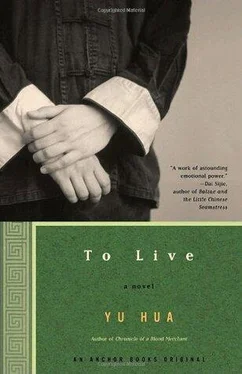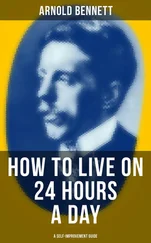After hearing him yell that, I was flustered. I thought it would perhaps be best if I left and did not see how he died. I squeezed my way out of the crowd and walked away in the opposite direction. After taking about ten steps I heard the “bang” sound of a gunshot and thought, Long Er is really done for. I never imagined that it would be followed by a second “bang,” and then three more — all together there were five shots. I wondered if they were executing someone else. On the way back I asked someone from my village, “How many people did they execute?”
“Just Long Er,” he replied.
Long Er really got dealt a bad hand. He took five shots — I’m afraid all five of his lives, if he had that many, were wiped out.
After Long Er was executed, cold chills ran up and down my neck the whole way home. The more I thought about it, the more I realized just how close I had come to being in Long Er’s shoes. If it hadn’t been for my father and me, the two prodigal sons, I would have been the one to be executed. I rubbed my face and arms — they were all okay. I thought, I should have died but didn’t. I escaped with my life from the battlefield, and when I came home Long Er took my place as the fall guy. The graves of my ancestors must have been in the right place.
“This time,” I said to myself, “I’ve got to keep on living.”
When I got home, Jiazhen was stitching the soles of my shoes. She took one look at how pale my face was and got scared nearly to death. She thought I was sick. But when I told her what I had been thinking, her face turned white, too, and then blue.
“That was really close,” she whispered.
Later, I didn’t take it so much to heart. I figured there was no reason to scare myself like this; it was all fate. As the saying goes, “If you escape a calamity with your life, there is bound to be good fortune to follow.” I figured the second half would just get better and better. I told this to Jiazhen. She broke a strand of thread with her teeth and looked at me.
“I don’t want any kind of good fortune,” she said. “I’ll be happy if I’m able to sew you a new pair of shoes each year.”
I understood what Jiazhen meant: My wife just wished that from now on we would never again be apart. Seeing how much older her face looked, my heart began to ache. Jiazhen was right. As long as our family could be together every day, who really cared about good fortune?
Fugui’s narration stopped here. I realized we were both sitting right in the sun. The changing path of the sunlight had caused the shadow of the tree to gradually leave us and turn in another direction. Fugui’s body shook a bit before he could stand up. As he patted his knees he said to me, “My whole body keeps getting stiffer and stiffer. Only one part keeps getting softer.”
After hearing that, I couldn’t help but laugh out loud. I looked down at his drooping pants and saw some blades of grass there. He also laughed, happy that I got his joke. Then he turned around and called out to his ox, “Fugui.”
The ox had emerged from the water and was eating the grass beside the pond. He stood under a pair of willow trees. The willow branches extending over his back had lost their perpendicular quality and appeared disorderly and crooked. Brushing against the ox’s back, a few leaves floated slowly to the ground. The old man called out again, “Fugui.”
The ox’s rump looked like a big rock as he slowly moved back into the water, and then his head reappeared, breaking through the willow branches. His two round eyes leisurely turned to look at us, and the old man told him, “Jiazhen and the rest of them have already started working. You’ve rested enough. I know you haven’t eaten your fill, but who told you to stay in the water so long?”
Fugui led the ox to the irrigated field, and while he was hooking up the plow he said to me, “When oxen get old, they’re just like old men. When they are hungry they’ve got to rest for a while so they have energy to eat.”
I sat back down under the shade of the tree. Putting my backpack behind me, I leaned up against the tree and used my straw hat as a fan. Long flaps of skin on the ox’s stomach were sagging; as he moved the plow, his stomach was like a big water balloon, with the water sloshing around inside. I noticed Fugui’s pants hanging down, which looked just like the skin on the ox’s stomach.
That day I sat in the shade of the tree until dusk fell. I didn’t leave because Fugui’s story wasn’t finished.
Those years after I returned home were difficult, but I guess you could say they went smoothly. Fengxia and Youqing got bigger by the day, and me, I got older and older. I didn’t really notice, and neither did Jiazhen. I just felt like I didn’t have as much energy as I used to. Then one day when I was carrying a load of vegetables into town, a friend called out to me as I passed the old silk shop, “Fugui, your hair’s turned all gray.”
It had only been six months since I’d last seen him. As soon as he said that I began to feel really old. When I got home I looked Jiazhen up and down. She didn’t know what was going on. She lowered her head to look herself over, and looked behind her, and finally asked, “What are you looking at?”
I laughed as I told her, “Your hair’s gray, too.”
That year Fengxia turned seventeen, and she began to look like a woman. If she hadn’t been deaf and mute, people would have already been knocking on our door with marriage proposals. All the people in the village said Fengxia had grown up into a pretty young woman; she looked almost the same as Jiazhen had when she was young. Youqing was twelve years old and was going to elementary school in town.
Some years earlier, Jiazhen and I had hesitated about whether or not we should send Youqing to school — we simply didn’t have the money. At the time Fengxia was only twelve or thirteen, and although she could help Jiazhen and me with some work in the field and around the house, she was still dependent on us. Jiazhen and I discussed whether we should just give her to someone else and be done with it. That way we could save some extra money for Youqing to go to school. Even though Fengxia was deaf and mute, she was smart. As soon as Jiazhen and I started discussing giving her away, Fengxia would come over and stare at us. Her two eyes would blink and our hearts would want to break, and we wouldn’t bring it up again for a couple of days.
But seeing Youqing getting closer and closer to school age, I knew I couldn’t put it off any longer. I had some of the people in the village ask around to see if anyone was willing to raise a twelve-year-old girl. I told Jiazhen, “If a good family wants her, Fengxia will have an even better life than she has now.”
Jiazhen nodded, but her tears still fell. A mother’s heart is always a bit soft. I tried to convince Jiazhen to be a little more open-minded. Fate had dealt Fengxia a cruel hand, and I was afraid that in this life she was going to suffer the worst. But Youqing shouldn’t suffer all his life — only if we let him go to school would he have a good future. We couldn’t allow the kids to be set back by poverty. At least one of them should be able to have a better life one day.
The people in the village who had asked around about Fengxia came back saying she was a little too old; had she been a year younger there would have been a lot of families interested. Hearing that, we pretty much gave up on that idea. We never expected that a month later two different families would send messages saying they wanted our Fengxia. One family wanted her for their daughter, the other wanted her to look after an old couple. Jiazhen and I both thought that the family without a daughter was better. If they took Fengxia as their daughter they would love her and care for her more than the elderly couple would. We sent a verbal message for them to come take a look. The couple came, and after seeing Fengxia they really liked her, but as soon as they learned she couldn’t speak they changed their minds. The husband said, “She looks good, but. ”
Читать дальше












